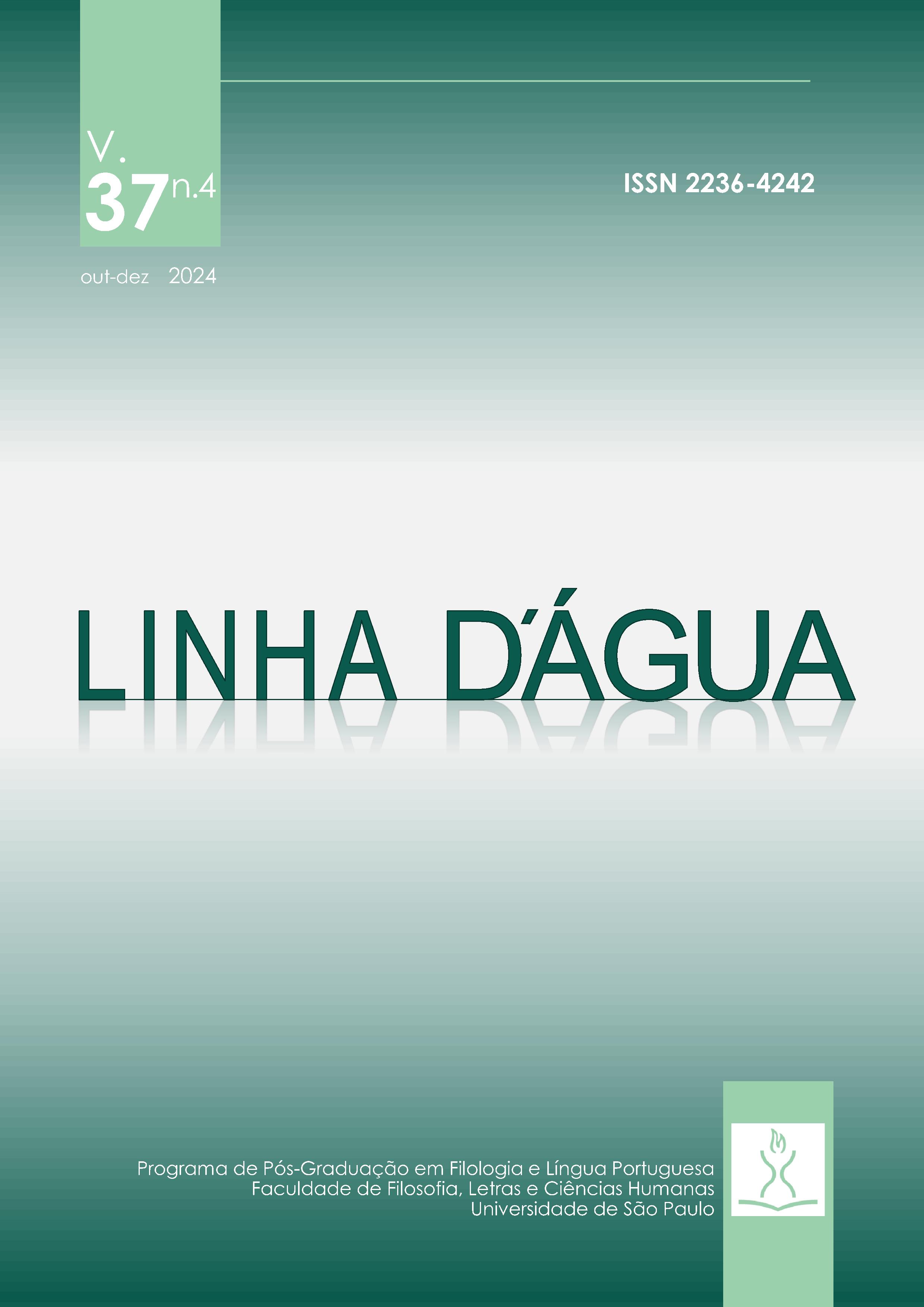Uma cartografia do sujeito autoral de mulheres negras em cartas
DOI:
https://doi.org/10.11606/issn.2236-4242.v37i4p298-313Palavras-chave:
Textos Epistolares, Sujeito Autoral, Escrevivência, Memória Cultural, Memória ColetivaResumo
O presente artigo tem como objetivo analisar alguns textos epistolares contemporâneos de mulheres negras, compreendendo-os como importantes instrumentos de reconstrução da memória coletiva e cultural da população negra através da escrevivência, fenômeno diaspórico e universal que atravessa a escrita das mulheres negras que serão analisadas, a partir da constituição do sujeito autoral do texto. Analisaremos como a escrevivência presente nos textos epistolares de mulheres negras é um exercício de memória, transgressão e rompimento com um sistema racista, opressor e violento. Essas sujeitas-autoras encontram na escrita um lugar de emancipação e empoderamento que, nas cartas, é compartilhado com destinatárias-leitoras.
Downloads
Referências
AKOTIRENE, C. Interseccionalidade. São Paulo: Sueli Carneiro; Pólen, 2019.
ANGELOU, Maya. Carta a minha filha. Rio de Janeiro: Nova Fronteira, 2019.
BAKHTIN, M. Marxismo e filosofia da linguagem. São Paulo: Hucitec, 1988.
BETTIOL, M. R. B. Mário de Andrade e a especificidade do gênero epistolar: o esboço de uma teoria. Revista do Instituto de Estudos Brasileiros, Brasil, n. 65, p. 227-236, dez. 2016. Disponível em: https://www.scielo.br/j/rieb/a/PtM5tbvVb8qdx6RnDcqWLKw/?format=pdf&lang=pt. Acesso em: 10 de abril de 2024.
CÁRDENAS, Teresa. Cartas para a minha mãe. Rio de Janeiro: Pallas Editora, 2010.
COLLINS, P. H.; BILGE, S. Interseccionalidade. 1. ed. São Paulo: Boitempo, 2021.
COSTA, S. L. O que (ainda) podem as cartas?. Interdisciplinar- Revista de Estudos em Língua e Literatura, São Cristóvão-SE, v. 19, 2013, p. 87-98. Disponível em: https://cartasindigenasaobrasil.com.br/wp-content/uploads/2020/10/O-que-ainda-podem-as-cartas.pdf. Acesso em: 17 de abril de 2024.
COSTA, S. L.; XUCURU-KARIRI, R. Cartas para o bem viver. 1. ed. Salvador: Boto-cor-de-rosa livros arte e café /paraLeLo13S, 2020.
DUARTE, R. De Rosinês Duarte para Eva, sua filha, In: COSTA, S.L.; XUCURU-KARIRI, R. Cartas para o bem viver. 1. ed. Salvador: Boto-cor-de-rosa livros arte e café /paraLeLo13S, 2020, p. 142-148.
ELIA, L. O conceito de sujeito. Rio de Janeiro: Zahar, 2004.
EVARISTO, C. A Escrevivência e seus subtextos. In: DUARTE, C. L.; NUNES, I. R. Escrevivência: a escrita de nós. Rio de Janeiro: Mina Comunicação e Arte, 2020. Disponível em: https://www.itausocial.org.br/wp-content/uploads/2021/04/Escrevivencia-A-Escrita-de-Nos-Conceicao-Evaristo.pdf. Acesso em: 09 de março de 2024.
FOUCAULT, M. A escrita de si. In: FOCAUL, M. O que é um autor. Lisboa: Vega, 1992, p. 129-160.
HARTMAN, S. Perder a mãe: uma jornada pela rota atlântica da escravidão. Rio de Janeiro: Bazar do Tempo, 2021.
JESUS, C.M. Quarto de Despejo. 1. ed. Livraria Francisco Alves, Rio de Janeiro: 1960.
LISPECTOR, C. As três experiências. In: LISPECTOR, C. A descoberta do mundo. Rio de Janeiro: Rocco, 1999.
MORAES, M. A. (Org.). Correspondência Mário de Andrade e Manuel Bandeira. São Paulo: EDUSP, 2001.
MORAES, M. A. Cartas, um gênero híbrido e fascinante. In: Jornal da Tarde, São Paulo, 28 nov. 2000. Caderno de Sábado.
MORAES, M. A. Mário, Otávio: cartas de Mário de Andrade a Otávio Dias Leite (1936-1944). São Paulo: IEB-USP/Imprensa oficial, 2006.
RIBEIRO, D. Cartas para minha avó. São Paulo: Companhia das Letras, 2021.
SARAIVA, J. I. A. A formação do sujeito e a literatura. Nonada: Letras em Revista, v. 1, n. 12, 2009, p. 1-9. Disponível em: https://www.redalyc.org/pdf/5124/512451678008.pdf. Acesso em: 04 de abril de 2024.
WALKER, A. A cor púrpura. 1. ed. - Rio de Janeiro: José Olympio, 2016.
Downloads
Publicado
Edição
Seção
Licença
Copyright (c) 2024 Tainara Cecília Pereira Santos, Rosinês de Jesus Duarte

Este trabalho está licenciado sob uma licença Creative Commons Attribution-NonCommercial 4.0 International License.
A aprovação dos manuscritos implica cessão imediata e sem ônus dos direitos de publicação para a Linha D'Água. Os direitos autorais dos artigos publicados pertencem à instituição a qual a revista encontra-se vinculada. Em relação à disponibilidade dos conteúdos, a Linha D'Água adota a Licença Creative Commons, CC BY-NC Atribuição não comercial. Com essa licença é permitido acessar, baixar (download), copiar, imprimir, compartilhar, reutilizar e distribuir os artigos, desde que para uso não comercial e com a citação da fonte, conferindo os devidos créditos autorais à revista.
Nesses casos, em conformidade com a política de acesso livre e universal aos conteúdos, nenhuma permissão é necessária por parte dos autores ou do Editor. Em quaisquer outras situações a reprodução total ou parcial dos artigos da Linha D'Água em outras publicações, por quaisquer meios, para quaisquer outros fins que sejam natureza comercial, está condicionada à autorização por escrito do Editor.
Reproduções parciais de artigos (resumo, abstract, resumen, partes do texto que excedam 500 palavras, tabelas, figuras e outras ilustrações) requerem permissão por escrito dos detentores dos direitos autorais.
Reprodução parcial de outras publicações
Citações com mais de 500 palavras, reprodução de uma ou mais figuras, tabelas ou outras ilustrações devem ter permissão escrita do detentor dos direitos autorais do trabalho original para a reprodução especificada na revista Linha D'Água. A permissão deve ser endereçada ao autor do manuscrito submetido. Os direitos obtidos secundariamente não serão repassados em nenhuma circunstância.











